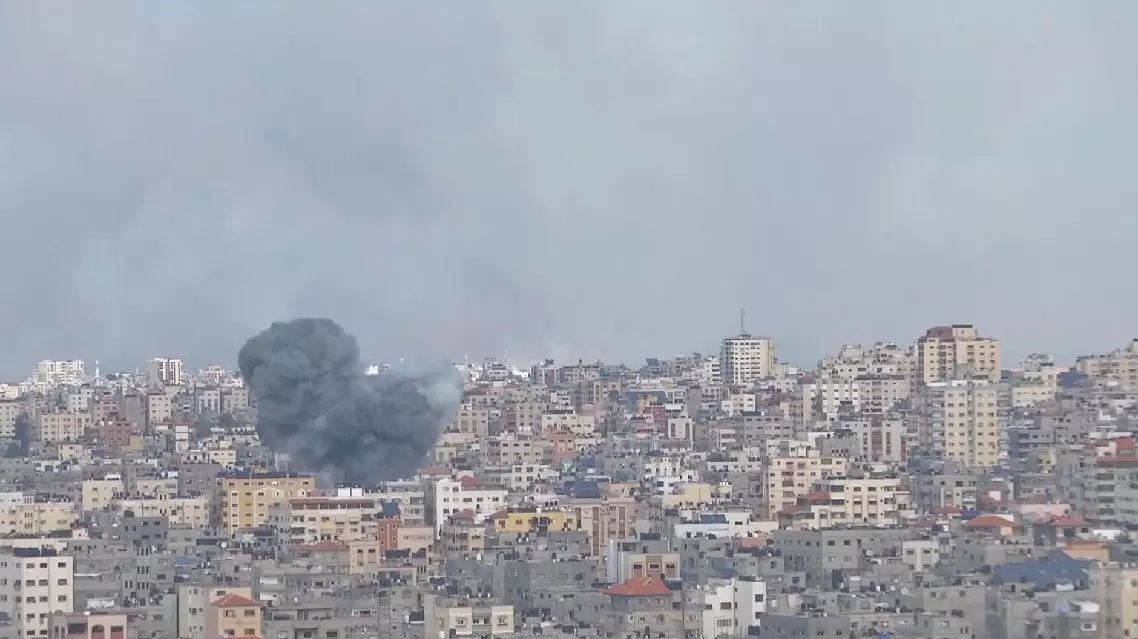Monday marks a full year since the start of the new round of the Palatine-Israel conflict, which has brought profound suffering to the regions and peoples concerned.
Over the past year, the situation has intensified from Gaza to Lebanon and has encompassed much of the Middle East. Israeli Prime Minister Benjamin Netanyahu said in a video speech on Saturday that Israel is now fighting on seven fronts.
The year-long conflict and its spillover effects have brought great suffering to the two million residents of the Gaza Strip. As of Sunday, more than 41,870 Palestinians have been killed, including over 16,000 children, and 97,166 have been injured in Gaza. Israeli attacks destroyed 60 percent of Gaza's residential buildings, 85 percent of its school buildings, 65 percent of its transportation network, and 65 percent of its farmland.
In Lebanon, more than 2,000 people have been killed since October 2023, including more than 1,000 deaths in the large-scale bombing launched by Israel since Sept. 23 this year. This round of conflict has also resulted in the deaths of more than 1,000 Israeli civilians and hundreds of Israeli soldiers.
The following is a summary of the important events in the past year since the conflict broke out.
On Oct. 7, 2023, Hamas announced a military operation codenamed "Al-Aqsa Flood" against Israel, launching a massive number of rockets into Israel. Israeli Prime Minister Netanyahu then announced that Israel had entered a state of war, marking the outbreak of a new round of Palatine-Israel conflict.
After bombing the Gaza Strip, Israel called on the residents of Gaza City to evacuate to the southern Gaza Strip on Oct. 13, 2023, and launched a ground operation in Gaza on Oct. 27.
The two sides ceased fire for a week starting from Nov. 24, 2023. The ceasefire agreement ensured the release of about 80 Israeli detainees, and Israel released about 240 detained Palestinians. The ceasefire also enabled a large amount of humanitarian supplies to enter the Gaza Strip from Egypt.
On April 1, 2024, the consular department building of the Iranian Embassy in Syria was hit by an Israeli missile. The airstrike killed seven Iranian military personnel. On April 14, Iran launched missile and drone attacks on Israeli territory in response to Israel's attack.
In early May 2024, the Israeli army began to attack Rafah in the southern Gaza Strip and took control of the border crossing between Gaza and Egypt.
On July 20, 2024, Israel bombed the port of Hodeidah in Yemen. On July 27, the Israeli-occupied town of Majdal Shams in the Golan Heights was attacked by rockets, killing 12 people. Israel retaliated on July 30, killing Hezbollah senior military commander Fuad Shukr in strikes in the Beirut area.
Hamas confirmed on July 31 that its politburo chief Ismail Haniyeh was assassinated in Tehran, the capital of Iran, early that morning.
Hamas said in a statement that Haniyeh was killed in an airstrike at his residence in Tehran after attending the inauguration of Iranian President Masoud Pezeshkian. Hamas said the attack was carried out by Israel.
In August 2024, Hamas and Israel negotiated again on a ceasefire agreement, but both sides accused each other of not truly wanting to reach an agreement, and the negotiations stalled.
On Sept. 17 and 18, Israel launched explosion attacks across Lebanon through wireless communication devices such as pagers, killing more than 30 Lebanese people and injuring about 3,000.
From the night of Sept. 27 to the early morning of Sept. 28, the Israeli forces launched an airstrike on the Hezbollah Central Headquarters in the suburbs of Beirut. On Sept. 28, the Israeli Army and Hezbollah successively confirmed that Hezbollah leader Sayyed Hassan Nasrallah was killed in the attack.
In the early morning of Oct. 1, the Israel Defense Forces announced that it had begun limited ground operations against Hezbollah targets and its infrastructure in the southern border area of Lebanon.
On the evening of Oct. 1, Iran launched a large-scale missile attack on Israel. About 200 missiles were fired, 90 percent of which hit the targets. Israel said that Iran would bear the consequences.
Some media said that Israel does not rule out attacking Iran's nuclear facilities in response to the Iranian missile attack, and Iran also stated that if Israel launches any attack on Iran, it will be subject to an unconventional response.
Faced with the escalating tensions in the Middle East, many countries have called on relevant parties to cease fire. The UN Security Council and the General Assembly have held several meetings on the situation in Gaza, Lebanon and Israel, and the situation in the Middle East, calling on all parties to cease fire.
Regardless of the international call, the United States repeatedly vetoed draft resolutions on a ceasefire in Gaza in the Security Council. It has provided 8.7 billion U.S. dollars in aid to Israel, and delivered more than 50,000 tons of weapons and military equipment over the past year.

New round of Palestine-Israel conflict reaches one-year mark









